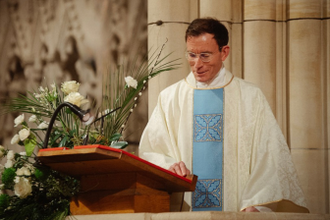Bishops' Advisor says Church is neglecting prisoners

The Prisons Adviser for the Catholic Bishops of England and Wales has accused those in the Church of failing as a faith community to stand alongside those in prison.
Addressing a Caritas Social Action Network seminar on criminal justice, Monsignor Malachy Keegan praised the Bishops Conference’s seven year old publication ‘In Place of Redemption’ but claimed those in prison had been neglected.
Monsignor Keegan called for “a stand alone annual prisoners Sunday in England and Wales.” At present prisoners week is not officially sanctioned by the Bishops Conference and often clashes with other calls on the faithful.
The prisons advisor attacked a societal attitude to punishment that sees an out of sight out of mind approach adopted. It is as though the offender is expelled from the community, so becomes even more isolated. “We need to speak out and say another way is better,” said Monsignor Keegan, who pointed out that prison, does not work as a deterrent. “I know plenty who would rather be in prison than outside, especially at certain times of year.”
He called for a system that is “more integrated and communal” with offenders accepted as part of the community not being caste out.
Director of the Prison Advice and Care Trust Andy Keen-Downs told of the managerialism that he encounters when dealing with government officials. He claimed they are mainly concerned with cost analysis and processing with blank faces often greeting the subject of rehabilitation when it comes up. “We need an end to the National Offender Management System and the establishment of a National Rehabilitation Service,” said Mr Keen-Downs.
Principal of St Charles Catholic Sixth Form College Paul O’Shea claimed there was weaker moral formation than there used to be among youngsters. “Boys get tempted by the status of gangsterism, there is a fractured psyche,” said Mr O’Shea, who lamented an education system that is driven by market conditioning.
He highlighted the destructive nature of this process which forced schools to select the most socially secure pupils. “If schools can select, they will select,” he said.
The head pointed out that a drop in the league tables will be likely to result in a loss of funding, so how does this help schools to work with the most disadvantaged children who need the most attention.
Mr O’Shea said it was not helpful to identify inner city criminality with race but more with poverty.
He did though identify “a black dimension” to it. “Young black manhood is an issue,” said Mr O’Shea. “There is a culture of victimhood that is a transatlantic import. It is about a manufactured sense of exclusion, saying you’ve denied me a job and educational achievement, so I‘ll claim gangs and crime as my place.”
Mr O’Shea called for the issue to be discussed amongst the black community. Some discourse has begun on the subject at his school.
Mr O’Shea also indentified a failure of agencies dealing with people in the criminal justice system to talk to each other, often due to confidentiality issues. “There are too many agencies in my view operating unthinking compliance that have stopped working in a supportative way,” said Mr O’Shea.
Sister Kathleen Diamond, who is the Catholic chaplain at HMP Holloway, told how there are now 600 inmates in the prison compared to 400 this time last year, yet fewer staff.
She claimed that many of those in Holloway had had a difficult time in life because of family. “Many are the victims of abuse, rape, domestic violence. Many have had abortions in the past that have affected them in some way,” said Sister Diamond, who identified how these issues would lead to a dependence on drugs and alcohol as a way to escape. “The bottom line is to have respect for each individual as a person,” said Sister Diamond, who recalled how effective the Sycamore programme had been in Holloway, bringing victims, offenders and families together. This programme has now ended due to the cuts.
Sister Diamond also identified how prisons can be positive places of healing. “Prison maybe the first place that some prisoners have found some type of healing. A space away from the world of drugs, where the deep seated problems can be addressed,” said Sister Diamond.
Professor of Criminal and Community Justice in the School of Law at the University of Strathclyde Mike Nellis identified how there had been a privatisation of the prisons and probation sector, often under the guise of the Big Society agenda. This also meant as voluntary organisation got increasingly pulled into the mix that the number who could speak out with a critical voice was dwindling. In this respect, Professor Nellist identified a crucial role for the Church in providing a critical voice. “Someone needs to bring humanity to the situation regardless of policy and the churches can do that,” said Professor Nellist. “The Church can restore the moral depth to ideas like rehabilitation. The Church could condemn the idea of commercialisation at the centre of the system.”


















